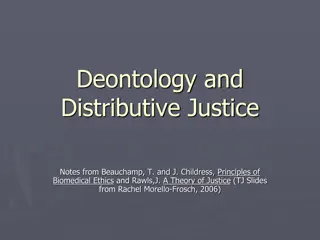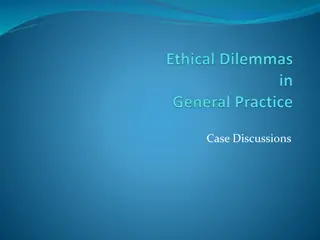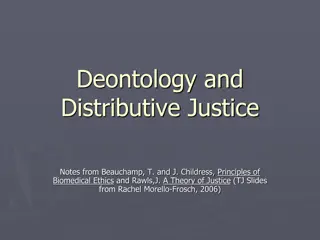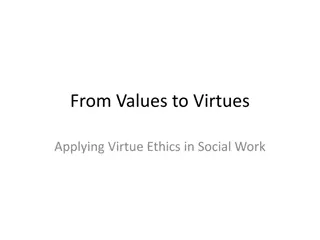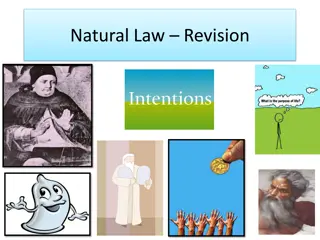Understanding Deontology and Distributive Justice in Ethics
Deontology, originating from the Greek words for duty and study of, focuses on morally required, forbidden, or permitted choices. It emphasizes obedience to duty and opposes utilitarianism, prioritizing what is morally right over the overall good. Unlike virtue theories, deontology assesses moral ob
2 views • 32 slides
Understanding Business Ethics Theories and Principles
Explore various business ethics theories including Ethical Concepts, Moral Behavior Development, Ethical Principles, and the Role of Ethics in Business. Delve into the concept of ethics, moral behavior evolution, ethical principles like autonomy, honesty, justice, and integrity, and the importance o
9 views • 17 slides
Understanding Medical Ethics: Principles and Applications
Ethics in the medical field involves moral limitations on power, emphasizing the importance of serving and protecting the vulnerable. Key principles such as autonomy, beneficence, non-maleficence, and justice guide ethical decision-making in healthcare, promoting respect, empathy, and fairness. Vari
0 views • 19 slides
Introduction to ABA, Ethics, & Core Principles: A Paradigm Overview
This chapter provides a historical context of approaches to ethical behavior in behavior analysis. It discusses theoretical conflicts, the importance of consequences, and reviews dominant paradigms in clinical ethics such as virtue ethics, consequentialism, and deontology. It explores the concept of
0 views • 38 slides
Deontology and Distributive Justice in Ethics
Deontology, rooted in the concept of duty, focuses on morally required, forbidden, or permitted choices. It emphasizes obedience to duty, opposing utilitarian claims. Unlike virtue theories, deontology prioritizes what is right over an overall conception of good. Immanuel Kant's categorical imperati
0 views • 32 slides
Applying Virtue Ethics in Social Work: From Values to Virtues
Exploring the application of virtue ethics in social work, this content delves into the transition from foundational values to virtuous character traits. It discusses the importance of moral qualities, virtues, and practical wisdom in making ethically informed decisions. Highlighted are the perspect
0 views • 14 slides
Understanding Natural Law Theory: Aquinas's Perspective
Natural Law Theory, influenced by Aristotle and Christian ethics, asserts that there are universal norms based on intrinsic goodness. Aquinas emphasized the importance of human rationality, linking reason to moral precepts and virtues. The theory promotes the idea of a final purpose for humans and t
0 views • 20 slides
Critique of Ethical Schools: A Comparative Analysis
This article explores three main ethical schools - utilitarianism, deontology, and virtue theory - and delves into their distinct emphases and elements. It highlights the differences in how each school views lying and ethical decision-making. Additionally, it discusses the incorporation of ethical p
0 views • 45 slides
